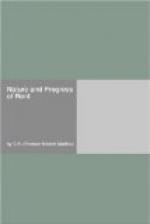Of the great additional quantity of capital employed upon the land in this country, during the last twenty years, by far the greater part is supposed to have been generated on the soil, and not to have been brought from commerce or manufactures. And it was unquestionably the high profits of agricultural stock, occasioned by improvements in the modes of agriculture, and by the constant rise of prices, followed only slowly by a proportionate rise in the different branches of capital, that afforded the means of so rapid and so advantageous an accumulation.
In this case cultivation has been extended, and rents have risen, although one of the instruments of production, capital, has been dearer.
In the same manner a fall of profits and improvements in agriculture, or even one of them separately, might raise rents, notwithstanding a rise of wages.
It may be laid down then as a general truth, that rents naturally rise as the difference between the price of produce and the cost of the instruments of production increases.
It is further evident, that no fresh land can be taken into cultivation till rents have risen, or would allow of a rise upon what is already cultivated.
Land of an inferior quality requires a great quantity of capital to make it yield a given produce; and, if the actual price of this produce be not such as fully to compensate the cost of production, including the existing rate of profits, the land must remain uncultivated. It matters not whether this compensation is effected by an increase in the money price of raw produce, without a proportionate increase in the money price of the instruments of production, or by a decrease in the price of the instruments of production, without a proportionate decrease in the price of produce. What is absolutely necessary, is a greater relative cheapness of the instruments of production, to make up for the quantity of them required to obtain a given produce from poor land.
But whenever, by the operation of one or more of the causes before mentioned, the instruments of production become cheaper, and the difference between the price of produce and the expenses of cultivation increases, rents naturally rise. It follows therefore as a direct and necessary consequence, that it can never answer to take fresh land of a poorer quality into cultivation, till rents have risen or would allow of a rise, on what is already cultivated.
It is equally true, that without the same tendency to a rise of rents, occasioned by the operation of the same causes, it cannot answer to lay out fresh capital in the improvement of old land — at least upon the supposition, that each farm is already furnished with as much capital as can be laid out to advantage, according to the actual rate of profits.
It is only necessary to state this proposition to make its truth appear. It certainly may happen, and I fear it happens frequently, that farmers are not provided with all the capital which could be employed upon their farms, at the actual rate of agricultural profits. But supposing they are so provided, it implies distinctly, that more could not be applied without loss, till, by the operation of one or more of the causes above enumerated, rents had tended to rise.




